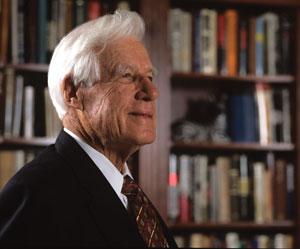By Sovereign Hager
Impunity Watch Managing Editor, News

ST. LOUIS, Missouri – On April 22, 2010 the world lost Whitney Harris, a leading advocate of international criminal justice. Harris was the last surviving prosecutor of the principal surviving Nazi war criminals at Nuremberg. He was ninety-seven years old.
Harris was originally from Seattle and attended the University of Washington. He went on to obtain his law degree from the University of California, Berkeley in 1936. Harris joined the Navy after the bombing of Pearl Harbor, and was charged with investigating war crimes after the war.
Harris was one of the first members of the staff for the trial of major German war criminals, trying twenty-two high ranking Nazi officials, leading to nineteen convictions. During the Nuremberg war-crime trials in 1945, Harris, then just thirty-three years old, served as a lead prosecutor and tried the senior leader of the Nazi Security Police. He was instrumental in getting the confession of Rudolf Franz Ferdinand Hoess, head of the Auschwitz concentration camp, and aided in the cross examination of Hermann Goering, Hitler’s second in command.
Following his service as a prosecutor, Harris continued a life of public service and continued to address war crimes and genocide. He served as Chief of Legal Advice during the Berlin Blockade and was a law professor at Southern Methodist University. Harris also served as chairman of the International Law Section of the American Bar Association. He authored “Tyranny on Trial, the Evidence at Nuremberg,” considered by the New York Times to be the first “complete historical and legal analysis of the Nuremberg trial.”
Harris’s later work centered on speaking, writing, and teaching about international law and justice. He gave numerous speeches on human rights and in 1980 established the Whitney R. Harris Collection on the Third Reich of Germany at Washington University in St. Louis. Today the Whitney Harris World Law Institute continues his legacy. The current director remembers Harris’ consistent emphasis of the good that came out of Nuremberg. “I think he had a truly undying faith in the ability of humankind to do better.” Harris was an outspoken supporter of international tribunals, which he saw as building and growing from the principles and achievements of Nuremberg.
In June of 2006, Harris recorded an essay for NPR’s “This I Believe Series,” where he shared these powerful words: “We must learn to end war and protect life; to seek justice and find mercy; to help others and embrace compassion.”